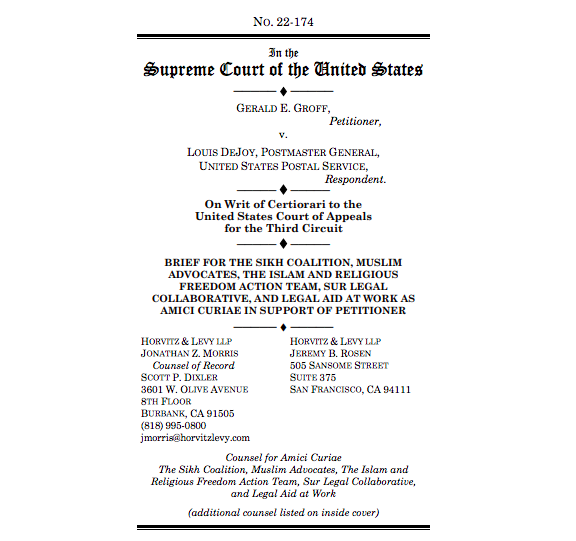Summary of facts: An evangelical Christian working for the US Postal Service (USPS) asked for Sundays off in order to observe the Sabbath and the USPS rejected his request. The US Court of Appeals for the Third Circuit held, under the Supreme Court’s 1977 decision in TWA v. Hardison, USPS was not required under Title VII of the 1964 Civil Rights Act to accommodate his request because doing so would impose on it more than a de minimis (i.e., nominal) cost. The employee appealed to the Supreme Court, which agreed to hear his case.
RFI’s position: Hardison’s misinterpretation of Title VII eviscerates the right to workplace accommodations for practitioners of all faiths, it has especially damaging effects for religious minorities. Adherents to minority faiths more often require workplace accommodations because their religious traditions are not already accommodated. Because Hardison strips Title VII of any meaningful accommodation requirement, employees whose religious practices include a certain appearance or attire may be forced to give up either the religious practice or the job. Both Muslim and Sikh employees have distinct practices that may require modest accommodations in some workplaces. Yet, pursuant to Hardison, courts and employers have rejected Sikh and Muslim workers’ requests for reasonable accommodations in dozens of cases under the de minimis rule.
Read the amicus brief here.
THE RFI BLOG

Myths of Religious Nationalism in America and Abroad

France’s Olympic Hijab Ban Violates International Law And Exacerbates Tensions

RFI Briefs USCIRF on Lessons from 25 Years of U.S. Designating Religious Freedom Violators

Thought Police: Protecting the People from Prayer

A Religious “Delaware”: Establishing a State Haven for Religious Corporations
CORNERSTONE FORUM

Challenges to Religious Freedom in Iraq and the Critical Need for Action

Public Bioethics & the Failure of Expressive Individualism

Religious Liberty in American Higher Education

Scotland’s Kate Forbes and the March of Secularism


